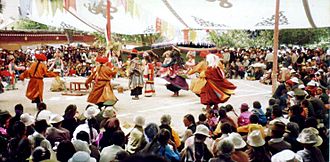Sho Dun Festival facts for kids
Quick facts for kids Sho Dun Festival |
|
|---|---|
 |
|
| Also called | Shoton Festival, Yogurt Festival, Banquet |
| Observed by | Tibetans, Bhutanese, Nepalese, Monpa |
| Type | Tibetan culture, Tibetan Buddhist |
| Frequency | Annual |
The Sho Dun Festival is a lively and colorful celebration that happens every year in Lhasa, the capital of the Tibet Autonomous Region. It's also known as the Shoton Festival or the Yogurt Festival. The name is easy to remember because in the Tibetan language, "Sho" means yogurt and "Dun" means banquet or party. So, it's a "Yogurt Party"!
The festival takes place at a beautiful palace called Norbulingka, which means "Jewel Park." It's a summer festival, usually starting around the middle of August. It is celebrated by Tibetans and people in nearby regions like Bhutan and Nepal.
The Story Behind the Festival
The Sho Dun Festival has a history that goes all the way back to the 11th century. It started as a religious tradition.
Buddhist monks would spend a month in their monasteries during the summer. They did this to avoid accidentally stepping on and harming small insects that come out in the warm weather.
When their month of retreat was over, the local people would welcome them back with a special treat: a banquet of fresh yogurt. This was their way of saying thank you to the monks. Over time, this simple banquet grew into the big festival it is today.
What Happens at the Festival?
While it started with yogurt, the Sho Dun Festival is now famous for much more. The main highlights are traditional Tibetan operas, called Lhamo.
The Amazing Operas
Imagine a play that lasts all day long! That's what Lhamo is like. These operas are full of energy and tell ancient stories and legends. The performances include:
- Loud Music: You'll hear the clashing of cymbals, ringing bells, and beating drums.
- Unique Singing: The performers sing in a special, powerful style.
- Colorful Costumes: Dancers wear amazing outfits, with long silk sleeves that swirl as they move. Characters include heroes, hooded villains, and leaping devils.
In the past, performers would travel from all over Tibet to be part of the festival. Today, the main performances are often by professional groups like the Lhasa Singing and Dancing Troupe. Families gather in parks, set up tents, and enjoy picnics while watching the shows. It's a wonderful time for communities to come together and celebrate their culture.
See also
 In Spanish: Sho Dun para niños
In Spanish: Sho Dun para niños
- Tshechu, a similar type of festival that is celebrated in Bhutan


